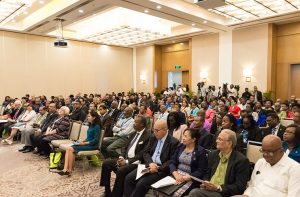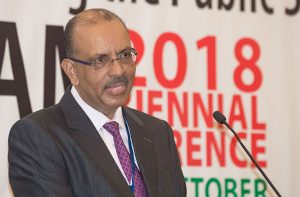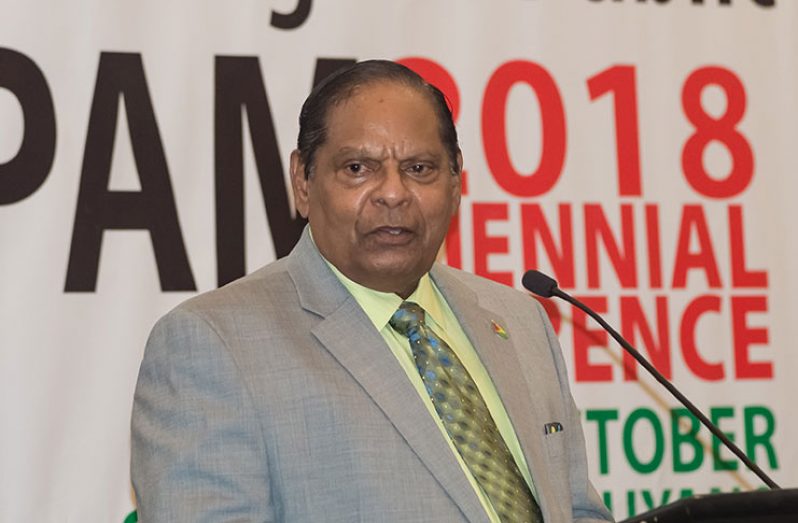…PM says national patrimony, climate considerations cannot be divorced
Under the theme: “Transforming the Public Sector for Climate Governance” acting President and Prime Minister, Moses Nagamootoo, said the public sector is a critical stakeholder in and guardian of the national patrimony and such cannot be divorced from climate considerations.
The acting President was at the time delivering the opening address at the Caribbean Association for Public Administration and Management (CAPAM) 2018 on Monday at the Marriott Hotel, Kingston.
The Biennial Conference is being held from October 22–24.
The conference is expected to create the opportunity for experts and practitioners to set out arguments for a prosperous future that includes the public service being responsible custodians for the environment.

“Guyana is keen to collaborate with and learn from all innovative ideas at this historic juncture when we ourselves are engaged in re-orienting and re-positioning our public sector to embark on the path of a green state agenda, as well as management of our environment as we develop a new oil and gas industry,” the statesman said.
He continued: “Oil and gas is the new buzz in town, and brings with it new responsibilities for the public sector. While the focus would be to develop and implement strategies to secure the better life for our citizens, the public sector has to be prepared to grapple with environmental and climate governance challenges, as well as the green agenda as a whole.”
The acting President explained that the integrated mandate of the public service which includes ministries, agencies and departments, is to ensure improved human and social wellbeing within this framework.
As such, Mr. Nagamootoo stressed that climate change is real and all sustainable development will require partnerships and collaborations across borders.
“Our own Rupununi Region experienced periodic severe flooding, even when rains did not fall in this area, but our rivers swelled from waters flowing from across our borders as a result of deforestation in some areas in the vast Amazon region,” he said.
This, Mr. Nagamootoo said, reveals the reality of cross-border implications and the need for inter-state cooperation as climate change can affect countries that may not themselves be internally vulnerable.
“We have seen the tropical storms, typhoons, hurricanes, earthquakes, floods and other natural disasters that are ravaging the world around us. Our sister Caricom state, the Republic of Trinidad and Tobago, is currently suffering from the effects of unpredictable weather changes, resulting in severe floods,” he said.
Further, the acting President said while CAPAM will invariably play its part in assisting with transformational change and international cooperation, a sustained, local multi-stakeholder approach to any green agenda is necessary for its effective and efficient implementation.
Adding that seven multi-stakeholder expert groups made up of public sector; private sector and wider civil society members have been working with the Green State Development Strategy since its beginning in 2017. Nagamootoo said the expert group on Sustainable Management of Natural Resources prioritised the expansion of environmental services and stewardship of the natural patrimony.
The prime minister explained that the seven expert groups on the pertinent green agenda areas in their detailed analyses, pointed to the strength in collaboration among all stakeholders, whether they are in the public service, private sector or the wider civil society.
However, the public sector, he said, must lead the way in preparing itself to meet the challenges of climate governance. It must also build networks and partnerships within and beyond sovereign borders.

The acting President noted that Guyana’s Green State Development Strategy (GSDS), the framework for which is being refined, offers a 20-year national development plan and serves as a mechanism for achieving the Sustainable Development Goals (SDGs) that have been adopted by all United Nations member states.
Meanwhile, President of the CAPAM Board, Dr. Ali Hamsa, spoke to the relevance of the conference’s theme noting that the effects of climate change are felt globally.
“The theme of our conference today is timely… ‘Transforming the Public Sector for Climate Governance’, that is; the effects of changing climate are being felt to various degrees around the world… With many regions experiencing both shared and unique climate challenges, it is clear that effective and efficient climate governance must occur across government systems through a multitude of sectors and industries in order to better tackle the complex environmental matters,” Dr. Hamsa said.
Echoing similar sentiments, Director of the Governance and Peace Directorate of the Commonwealth Secretariat, Ms. Katalaina Sapolu called for policy changes that reflect the urgent need for climate governance.
“The theme… is timely and important given the existential threat posed to humanity by climate change. The role of the public sector in climate change governance is, therefore, critical and governments are ultimately responsible for the implementation of a ‘green’ international global governance framework. Indeed for governments to meet their commitments to address climate change in accordance with the Paris agreement, the public sector needs to put in place appropriate national strategies, policies, and institutional frameworks. [Guyana] has set, for us, a very good example [in] its ‘Green’ State Strategy,” said Ms. Sapolu.
CAPAM provides an opportunity for government heads within the Commonwealth to exchange innovations in public sector management to promote good governance.
The conference is designed for an international audience of senior public sector managers and administrators. The three-day event will offer insightful dialogue, theoretical and practical knowledge exchange and networking opportunities.
According to a concept paper on the conference, “more and more, it becomes evident that strategic partnerships, consultation across political and bureaucratic boundaries and leading practices will advance innovative solutions and support the public service in determining and advising governments on ways to promote economic prosperity while protecting the natural productivity of our world.”
The note explains that with many regions experiencing both shared and unique climate challenges, effective and efficient climate governance must occur across government systems and sectors and industries to better tackle complex environmental matters.
In attendance was Minister of State, Joseph Harmon, Finance Minister, Winston Jordan, Minister of Public Security, Khemraj Ramjattan, Minister of Public Service, Rupert Roopnaraine, members of the diplomatic community and international officials.




.jpg)










